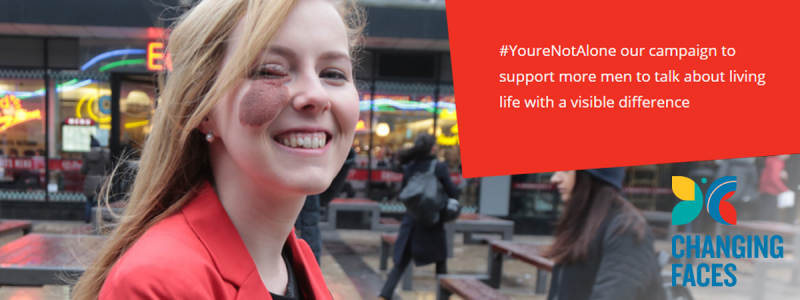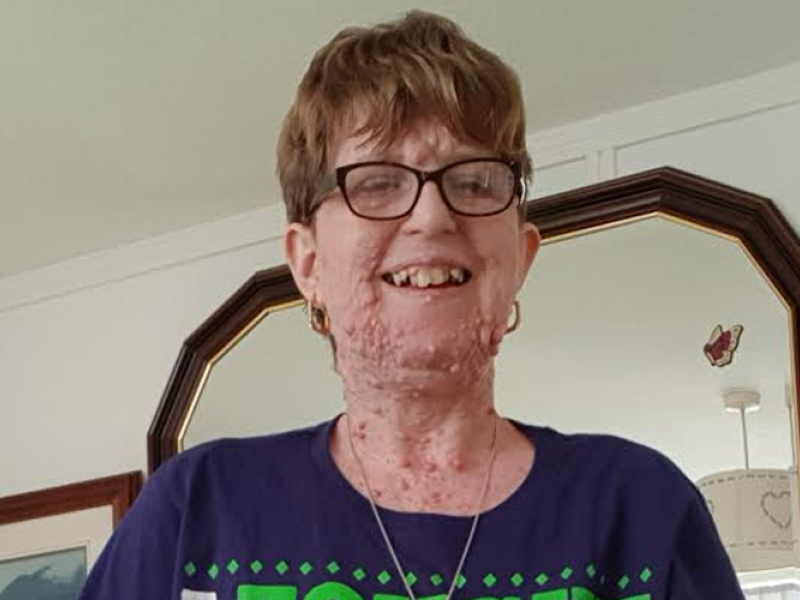Voices of Visible Difference #YoureNotAlone Men’s Campaign
30 September 2020
Voices of Visible Difference: Episode 4 Our #YoureNotAlone Men's Campaign
Over the next five days, Changing Faces is going to be focussing on the experiences of men with visible differences. Through their #YoureNotAlone men’s campaign, Nerve Tumours UK will be sharing their voices encouraging more men to seek appearance related support and featuring real stories of men living life with a visible difference. Currently only around 2 in 10 clients Changing Faces supports are men. The campaign is part to highlight existing support to men that are affected.

New research reveals two-thirds of men with a visible difference feel embarrassed, worried or afraid because they look different.
New survey of over 1,000 men with a visible difference by charity Changing Faces reveals:
Three-quarters of men with a visible difference say men are under pressure to meet macho male stereotypes (76%) and that men do not talk about their appearance (75%)
Nearly three-quarters of men (72%) say there should be more conversations among men with visible differences
A quarter (23%) of men with a visible difference feel self-conscious or embarrassed about showing parts of their body
Two-thirds (64%) of men with visible differences felt negative emotions, such as being embarrassed, worried or afraid, when they realised they looked different
Three-quarters of men with a visible difference say men are under pressure to meet macho male stereotypes and a quarter say they feel self-conscious or embarrassed about showing parts of their body. That’s according to the charity Changing Faces whose new research reveals six in ten men with a visible difference agree people react differently to a man with a visible difference than a woman.
The survey conducted by Savanta ComRes of over 1,000 men with a visible difference, such as a mark or scar, highlights how men with a visible difference are contending with a double challenge; handling the reactions of others, and living in a society where talking about appearance is still more acceptable for women than men.
Two-thirds (64%) of men with visible differences felt negative emotions, such as being embarrassed, worried or afraid, when they realised they looked different.
– Changing Faces CEO, Becky Hewitt"Looking different in a society that promotes and values ‘perfection’ is tough and it’s no wonder that men find it difficult to speak out about their experiences. All too often men with disfigurements are portrayed negatively, with scars often used as a shorthand for villainy.
Added to that there’s a prevailing attitude that men should ‘just get on with it’, and not worry about how they look. It’s a toxic blend that doesn’t help people who could really benefit from support."
The research found that three-quarters of men with a visible difference say men do not talk about their appearance but agreed that there should be more conversations among men.
– Changing Faces Campaigner, Rory McGuire"When you look different you have to be ready for daily stares and comments. That takes its toll, particularly if you don’t feel able to talk about how it makes you feel.
In my late teens I eventually started to speak out. At first, I shared my experiences online. I had positive reactions from all over the world, and closer to home, people realised the impact of appearance related bullying and abuse. Things started to change for the better.
We need men, and women, to know that it’s okay to talk about your appearance, and how other people’s reactions can make you feel."
The research also found that a quarter (23%) of men with a visible difference feel they are a stronger person because of looking different.
– Changing Faces Ambassador and Actor, Adam Pearson"When I look back at the young man I was, to the person I have become, I am very proud of him. It’s not always easy looking different in a world that is so focused on perfection.
Growing up there were no positive role models of people with disfigurements in the media. So now I’m on a mission to be more visible. I speak out and share my experiences, because if it helps one more man, or woman, feel able to share how they’re feeling about their appearance, that’s a job well done."
Changing Faces say currently only around 2 in 10 of the clients they support are men and have launched a campaign to encourage more men to come forward and access support services, such as free one-to-one counselling, peer group chat and an online self-help programme.
Hear more from men with visible differences
Changing Faces campaigners and ambassadors have been sharing their experiences of being a man and living life with a visible difference in the latest My Visible Difference podcast out now, guest hosted by Changing Faces ambassador Adam Pearson.
Filter News

London Marathon 2025 Team NTUK
Congratulations and a big THANK YOU to Team NTUK for their superb efforts
Read More
Ian’s Story
Read Ian's story and why he's going the extra mile for NF awareness and his daughter Emily
Read More
London Marathon 2025
Meet our 2025 London Marathon fundraisers—each running to support those affected by NF. Read & share their stories.
Read More_800_600_s_c1.jpg)
Nerve Tumours UK Virtual Coffee Mornings
Chat and connect in our newly announced NTUK Virtual Coffee Mornings
Read More_800_600_s_c1.png)
Understanding the Impact of Nerve Tumours UK: Insights from Our Latest Survey
Take a look at all the insights from our latest community surveys
Read More_800_600_s_c1.jpg)
Rare Disease Day 2025
All the highlights, updates and impact from NTUK's involvement in Rare Disease Day 2025
Read More
William & Andrew’s NF1 Story
Andrew's using his own obstacles in life to inspire his son William on his NF1 journey.
Read More
First Diagnosis Survey
A survey to improve NF diagnosis support by gathering feedback on early experiences and concerns from those affected.
Read More

